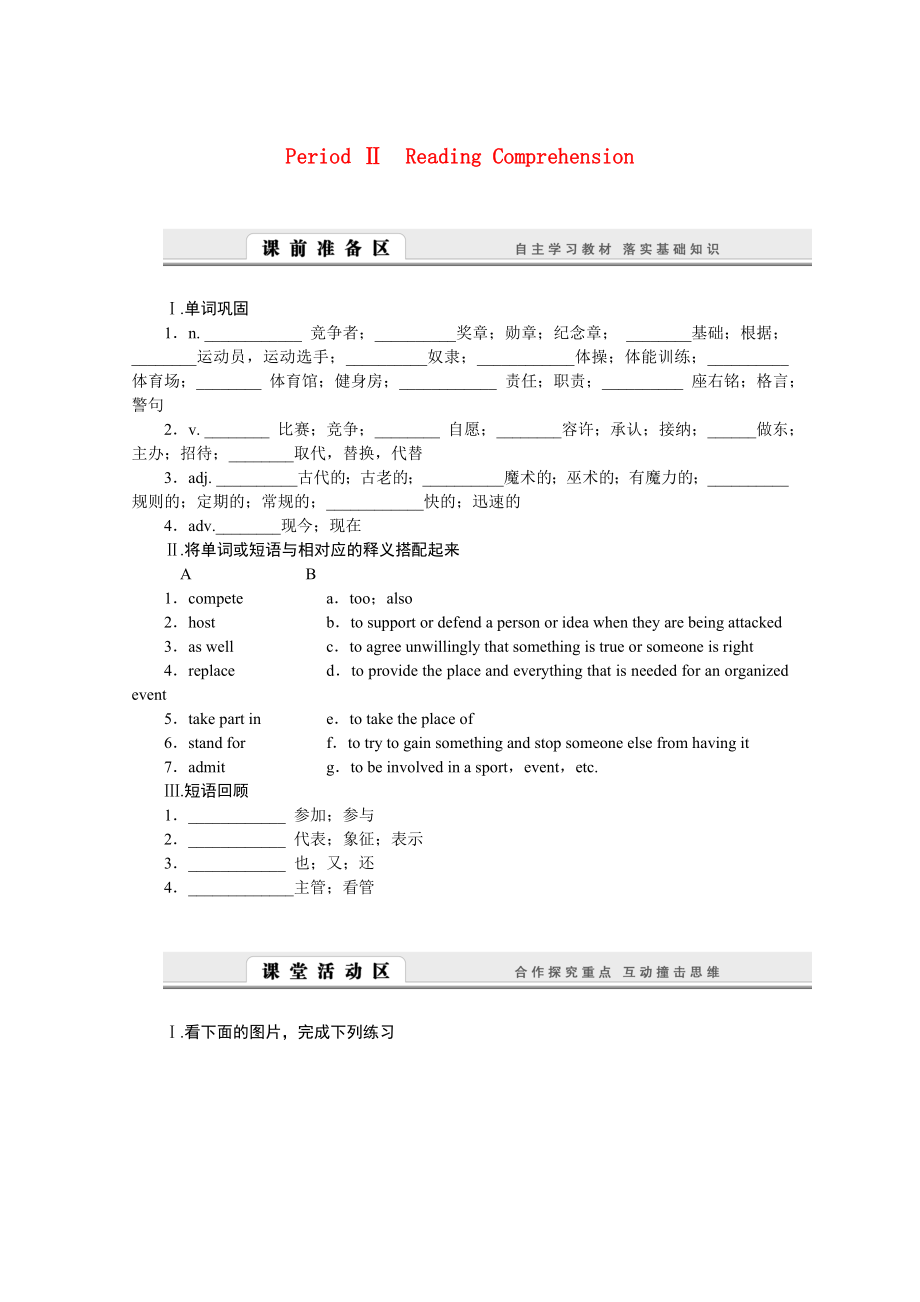《2016-2017學(xué)年高中英語 Unit 2 The Olympic Games Period Ⅱ Reading Comprehension學(xué)案 新人教版必修2》由會員分享�����,可在線閱讀���,更多相關(guān)《2016-2017學(xué)年高中英語 Unit 2 The Olympic Games Period Ⅱ Reading Comprehension學(xué)案 新人教版必修2(4頁珍藏版)》請在裝配圖網(wǎng)上搜索。
1�、Period Ⅱ Reading Comprehension
Ⅰ.單詞鞏固
1.n. ____________ 競爭者;__________獎?wù)?����;勛章��;紀(jì)念章; ________基礎(chǔ)����;根據(jù);________運動員��,運動選手�����;__________奴隸�;____________體操;體能訓(xùn)練�����;__________體育場�����;________ 體育館�����;健身房����;____________ 責(zé)任���;職責(zé);__________ 座右銘�;格言;警句
2.v. ________ 比賽��;競爭����;________ 自愿;________容許��;承認(rèn)����;接納��;______做東�����;主辦���;招待�;________取代,替換��,代
2���、替
3.a(chǎn)dj. __________古代的����;古老的���;__________魔術(shù)的���;巫術(shù)的;有魔力的����;__________規(guī)則的;定期的����;常規(guī)的;____________快的�;迅速的
4.a(chǎn)dv.________現(xiàn)今����;現(xiàn)在
Ⅱ.將單詞或短語與相對應(yīng)的釋義搭配起來
A B
1.compete a.too�;also
2.host b.to support or defend a person or idea when they are being attacked
3.a(chǎn)s well c.to agree unwillingly that som
3、ething is true or someone is right
4.replace d.to provide the place and everything that is needed for an organized event
5.take part in e.to take the place of
6.stand for f.to try to gain something and stop someone else from having it
7.a(chǎn)dmit g.to be involved in a sport�,event,etc.
4����、
Ⅲ.短語回顧
1.____________ 參加;參與
2.____________ 代表�����;象征���;表示
3.____________ 也�;又����;還
4._____________主管�;看管
Ⅰ.看下面的圖片,完成下列練習(xí)
1.寫出下列運動項目的英語名稱
A.______________ B.______________
C.______________ D.______________
E.______________ F.______________
2.寫出你最喜歡的運動的英語名稱
_____________________________________
5�、___________________________________
Ⅱ.看下面的圖片��,把這些城市和歷屆奧運會搭配起來
1.The 26th Olympics ______________
2.The 27th Olympics ______________
3.The 28th Olympics ______________
4.The 29th Olympics ______________
5.The 30th Olympics ______________
6.The 31st Olympics ______________
Ⅲ.根據(jù)課文內(nèi)容��,判斷正(T)��、誤(F
6�、)
1.Pausanias was a Greek writer about 2,000 years ago and wanted to know about modern Olympic Games.( )
2.We hold our modern Olympic Games every two years.( )
3.The Winter Olympics are usually held two years after the Summer Games.( )
4.The athletes from Greek cities used to compete against
7�����、each other just for the prize money.( )
5.Anyone who reached the agreed standard for their events can be admitted to take part in the Olympics.( )Ⅳ.閱讀課文內(nèi)容����,完成下列表格
Similarities
Ancient Olympics
Modern Olympics
1.Both are held ____________.
2.Both are held ______________________.
3.Men are all
8、owed to ____________ both in ancient and modern Olympics.
4.The mottos are the same. They are:__________________.
5.Some events are the same, such as __________________���,....
Differences
Ancient Olympics
Modern Olympics
Type
6.__________________________ Olympic Games
7.____________Olympic Gam
9�、es
Competiors
Only men in Greece 8.____________
Both 9.______________ all over the world are admitted
Place
10.____________
11.____________ is possible
Prize
12.____________
medals
Events
13.____________
More events
Ⅴ.根據(jù)課文內(nèi)容�����,選擇正確的答案
1.Who was Pausanias?
A.He was a famous athlete about
10����、 2,000 years ago.
B.He was a volunteer for the 2008 Olympics.
C.He was a famous writer about 2,000 years ago.
D.He was a Greek editor.
2.Why did Pausanias interview Li Yan?
A.To know something about the modern Olympics.
B.To know something about China.
C.To know something about the ancient Ol
11�����、ympics.
D.To know something about Li Yan.
3How often are the Winter Olympics held?
A.Every year.
B.Every other year.
C.Every three years.
D.Every four years.
4.In Pausanias’ times, ________ couldn’t take part in the Olympics.
A.young men B.old men
C.boys D.women and slaves
5.Whe
12�、re will the 2012 Olympics be held?
A.In Beijing. B.In London.
C.In Athens. D.In Sydney.
Period Ⅱ Reading Comprehension
課前準(zhǔn)備區(qū)
Ⅰpetitor��;medal�����;basis����;athlete;slave����;gymnastics;stadium����;gymnasium;responsibility����;motto
2.compete;volunteer�����;admit����;host�����;replace
3.a(chǎn)ncient�����;magical�����;regular����;swift
4
13、.nowadays
Ⅱ.1.f 2.d 3.a 4.e 5.g 6.b 7.c
Ⅲ.1.take part in 2.stand for 3.as well 4.in charge
課堂活動區(qū)
Ⅰ.1.skating table-tennis(ping-pong)
swimming diving basketball running
2.略
Ⅱ.1.Atlanta 2.Sydney 3.Athens 4.Beijing
5.London 6.Rio de Janeiro
Ⅲ.1.T 2.F 3.F 4.F 5.T
Ⅳ.1.every four years
2.not for money but for honour
3.take part in
4.Swifter���,higher and stronger
5.running��,jumping����,shooting 6.Only summer
7.Summer and winter 8.admitted
9.men and women 10.Greece 11.Every country 12.An olive wreath 13.Fewer events
Ⅴ.1.C 2.A 3.D 4.D 5.B
 2016-2017學(xué)年高中英語 Unit 2 The Olympic Games Period Ⅱ Reading Comprehension學(xué)案 新人教版必修2
2016-2017學(xué)年高中英語 Unit 2 The Olympic Games Period Ⅱ Reading Comprehension學(xué)案 新人教版必修2

